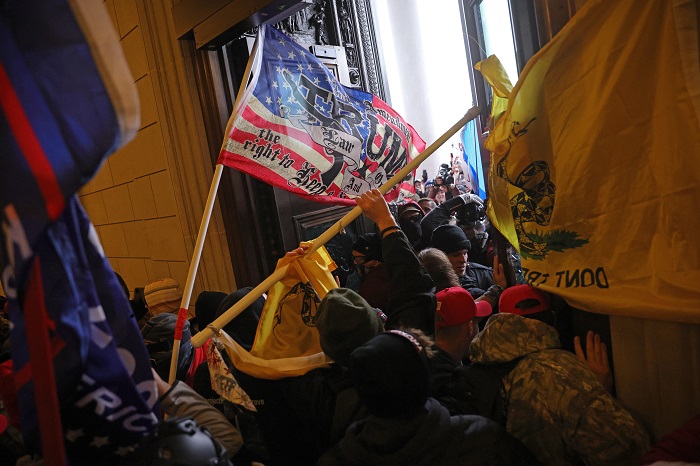How HR can ease employee angst following Capitol riots: As Trump supporters stormed the U.S. Capitol on Wednesday afternoon, halting President-elect Joe Biden’s election certification, employees nationwide anxiously watched the unfolding events, leaving company and HR leaders scrambling to deal with rising angst among their workforce. Following already skyrocketing rates of anxiety and mental health issues among employees, experts say company leaders should check in on their workers and encourage them to prioritize their mental wellbeing during times of crisis and unrest. Read more here.
Mayer: 7 benefit trends to watch in 2021: One of the most significant years in our history is behind us. But despite the calendar change, COVID-19 and its associated effects are still the main topic in HR departments around the country, affecting every component of the workplace. The pandemic has undoubtedly reshaped the benefits industry in 2020, teaching us important lessons along the way. But what’s ahead for the coming year? Considering the many employee challenges the pandemic helped to expose, as well as the rollout of COVID-19 vaccines, plenty. Here are seven of the biggest health and benefit trends I expect to define the year ahead. Read more here.
5 things HR should do now in wake of the Capitol riots: With many employees mentally struggling in the aftermath of the riots that occurred Wednesday at the U.S. Capitol, organizations are pondering what they should do regarding the event. Bottom line: Company and HR leaders shouldn’t stay silent, experts say. Here is what HR pundits say organizations should do now. Read more here.

(Photo by Win McNamee/Getty Images)
Why, and how, company leaders should address the Capitol riots: The U.S. Capitol riots that occurred Wednesday were difficult for most Americans to watch, with workers nationwide glued to the news for most of the day. Add to that the continuing stress of the COVID-19 pandemic and the post-holiday blues, and organizations are dealing with employees who are feeling more anxious and unsettled than ever. The mob attack that occurred, halting President-Elect Joe Biden’s election certification, was the latest in a string of difficult events that have had a negative impact on employees’ mental health over the past year. That’s just one reason company and HR leaders need to step up and help employees in light of this week’s events, says Jaime Klein, founder and CEO of consulting firm Inspire Human Resources. Read more here.
Expert advice to help HR focus on Black mental health this week: This week’s insurrection in Washington, D.C., by pro-Trump supporters is the latest alarming national event to impact the psyche of American workers, already strapped by social unrest and a global pandemic. While HR pundits have urged leaders to prioritize employees’ mental health in light of the events, many are also strategizing how to address a population that could be particularly affected: Black employees. Read more here.
Employers can legally require COVID vaccines—but will they? As COVID-19 vaccines are approved and begin to roll out across the country, employers are asking one question: Should—and could—we make the vaccine mandatory for employees? The bottom line is that employers can require employees to get immunized with the coronavirus vaccine, with some accommodation exceptions. So employers can legally mandate the new vaccinations—but will they? And should they? Experts say that depends. Read more here.
COVID-19 has workers paying more attention to their 401(k)s: Although COVID-19 has dealt a blow to many employees’ retirement behavior and optimism, there’s at least one bright spot: The pandemic has caused some participants to pay more attention to their retirement accounts and savings progress. Although 60% of respondents in a new survey from provider Vestwell said their behavior regarding their 401(k) stayed the same over the last year, about one-quarter said they checked their account more often, 10% increased their contributions and 6% made investment changes. Read more here.
Addiction risk on the rise for female employees: Women’s risk of drug and alcohol addiction is up 65% since September, the latest startling figure to come out of Total Brain’s most recent Mental Health Index. According to the new data, in addition to dealing with depression, stress and anxiety during COVID-19, more women are turning to substances in an attempt to cope. Additionally, female employees’ risk of sleep apnea has also climbed 126% over the past 10 months, according to the index, signaling complete physical and mental exhaustion, experts say. Read more here.
What happens when COVID-19 and addiction collide? When we think of the number of lives lost to or impacted by COVID-19, it probably doesn’t include those who have been victims of addiction. While the scourge of addiction is not new and will continue to remain a significant issue long after the coronavirus pandemic has ended, the “collision” of addiction with COVID-19 has resulted in a host of challenges that have exacerbated an already serious substance abuse situation and obstructed efforts to contain it. Read more here.